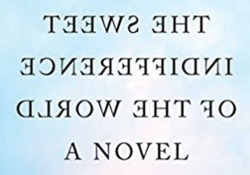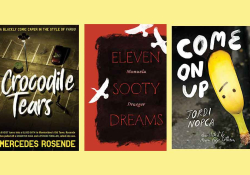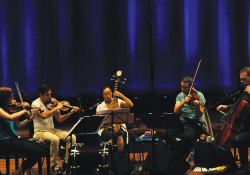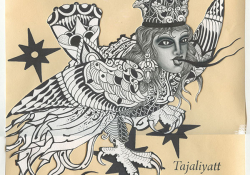Soundtracking Colonel Lágrimas

I picked up Carlos Fonseca’s Colonel Lágrimas, translated by Megan McDowell (Restless Books, 2016), because I was immediately struck by the conflict in the title: “colonel tears.” Within the novel, I found a similar tension in Fonseca’s challenging and humanizing portrayal of the final day in the life of “the colonel,” an aging, enigmatic man loosely based on the famous and reclusive mathematician Alexander Grothendieck.
As the colonel sits alone in a cottage in the Pyrenees and attempts to complete his mysterious masterwork, a voyeuristic group of near-omniscient narrators rifles through his belongings and his mind to find the “secret” of his passion—often insisting that the reader be complicit in this search. We (readers) find ourselves in a Borgesian labyrinth of memory, fractured and swirling, imbued with a particular and pensive sadness, a portrait of a lonely man reckoning with an uncertain past and an unwanted legacy. Fonseca utilizes this fragmented narrative to suspend the colonel’s story in a state of flux; throughout the five parts of the novel, temporality stretches and collapses as the narrative creates a palimpsest of memory and self that reveals the restless history of the twentieth century.
I enjoyed this slow novel that, at times, felt claustrophobic in its difficulty and its desolation, because its frequent storytelling detours layered nuance into a complex, unimpeachably human character. Through the splintered stories of a man who was the architect and victim of his own loneliness, Colonel Lágrimas accomplishes a unique empathy: the colonel’s identity arises not chronologically but holistically. Fonseca fashions a nameless character whose personality, idiosyncrasies, and utter isolation feel all too real.
The music that I have chosen to accompany Colonel Lágrimas, listed below, is informed (quite obviously, to those who know me) by my particular affinity for alternative and indie rock. I’m lucky that this novel is a reflecting pool for my type of music: this playlist peers into the novel and sees itself, acoustic and melancholy. Or, perhaps, these roles are reversed—quite Borgesian of me, I suppose. Or, might I say, Fonsecan.
The playlist, like the novel, is both kaleidoscopic and partitioned. It can be played chronologically and will express a similar wistful logic to the five numbered sections of Colonel Lágrimas. Conversely, when shuffled, the playlist embraces a scattered narrative that leads the reader through the oft-divided pages of the novel, through flashpoints of past and present, digressions and scribblings and memories, and pieces that resist the essentializing desire that grips every reader: to know what, exactly, the story is.
1 “The Home – Acoustic,” by Portugal. The Man
The melancholic beginning of this playlist mirrors the opening section of the novel, which introduces the colonel’s lonely mission: to make a home in the mountains where he can disappear into his masterwork. The echoing, choral vocals in this song evoke the colonel’s isolation in the Pyrenees.
2 “Wake Up,” by Young the Giant
With swirling guitar riffs and lyrics about reincarnation, this song captures the colonel’s yearning to hide behind the lives of others by writing their stories in his masterwork. However, the colonel’s own story surfaces as memories of his nomadic and war-torn childhood interrupt the narrative.
3 “Black Water,” by Of Monsters and Men
This song, which swells with emotion and speaks of losing oneself in the sea of someone else, encapsulates the colonel’s desperate endeavor to achieve anonymity. He continues to write—to slip beneath the waves of his masterwork, to drown himself in the stories he tells.
4 “What You Live By,” by Harvey Danger
This song marks the beginning of the second section of the novel, where the colonel steps away from his masterwork to take a nap. The mournful guitar and marching piano implicate the colonel’s irreversible inertia—his simultaneous ennui and unflagging obsession—even in this quiet moment.
5 “Tongues,” by Joywave
With a fantastical and upbeat sound, this song echoes the colonel’s struggle to communicate and form relationships. As the colonel sleeps, the narrators discover a photograph of an unknown woman and delve into the cryptic correspondence between the colonel and his devoted disciple Maximiliano Cienfuegos.
6 “Into the Barrens,” by Grizfolk
A song that speaks of delirium and desolation marks the midpoint of the playlist. The lyrics are imbued with a gravitational futility whose momentum mirrors that which drives the colonel and Maximiliano, two downtrodden men descending into their own respective barrens.
7 “Could Have Been Me – Live / Acoustic,” by The Struts
This stripped-down version of a hit song waxes wistfully about legacy, about moments seized and opportunities missed. In the brief third section of the novel, the colonel—now a hollower version of his former celebrity—retreats to his rose garden and reflects on his interpersonal failings and chosen isolation.
8 “Time,” by Ben Folds
In a song heavy with regret, sorrowful piano and vocals paired with an ethereal choral backing frame the colonel’s memories of his mother and his lost love. Here, as the fourth section of the novel opens, the colonel’s loneliness floods the narrative like a wave.
9 “The Other Side, by Jukebox the Ghost
This atmospheric, acoustic song meditates on the inexorable passage of time and resonates with the colonel’s fascination with legacy. When the narrators take the reader to explore the colonel’s home, they discover a room full of taxidermy butterflies frozen in time at their most beautiful.
10 “The Lighthouse’s Tale,” by Nickel Creek
In the penultimate song, a lighthouse tells its story of death and grief with an airy, frail sound. This song’s resigned recognition of the unchangeable past pervades the final section of the novel; the colonel, drunk and alone, gives a rambling sermon about another life that reflects his own.
11 “We All Die Trying to Get It Right,” by Vance Joy
The playlist ends as the colonel’s last day draws to a close. This quiet, retrospective song has a celestial vibe, and its lyrics underscore the ultimate futility of the colonel’s mission for anonymity while speaking to the novel’s overarching examination of legacy and remembrance.












